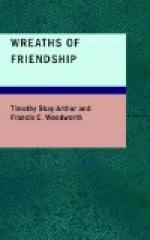The king of fairy land was called Oberon—the queen, Titania. The king used to wear a crown of jewels on his head, and he always carried a horn in his hand, which set every body around him to dancing, whenever he blew it. Ben Jonson, a poet who flourished a great many years ago, speaks very respectfully of fairies and elves, in his poems. In describing the haunts of his “Sad Shepherd,” he says—
“There, in the stocks of trees,
white fays do dwell,
And span-long elves that dance about
a pool.”
Shakspeare, too, in several of his plays, makes us quite familiar with the fairy people. Shakspeare, you are aware, wrote in the time of Elizabeth, and as late as that period, there were thousands in England and Scotland in whose creed the existence of such a race of spirits was a very important article. It was not long, however, after this, before the superstition about the fairies—which, at the worst, was a very foolish affair—began to decline. But that decline brought a dark night to thousands of poor, innocent men and women; for then came the era of witchcraft, and persons of every rank, convicted of this imaginary crime, were hurried to the scaffold or the stake.
In the beginning of the seventeenth century, Dr. Corbett, Bishop of Oxford and Norwich, wrote a very humorous satire on the fairy superstition, called “The Fairies’ Farewell, a proper new ballad to be sung or whistled to the tune of Meadow Brow.” Perhaps I cannot better take leave of these very curious imaginary people, than to employ a couple of stanzas from the bishop’s playful ballad:
“Witness those rings and roundelays
Of theirs, which yet
remain,
Were footed in Queen Mary’s
days,
On many a grassy plain;
But since of late Elizabeth,
And later James came
in,
They never danced on any heath,
As when the time hath
been.
“By which we note the fairies
Were of the old profession;
Their songs were Ave Marias,
Their dances were processions;
But now, alas! they all are dead,
Or gone beyond the seas,
Or further for religion fled,
Or else they take their ease.”
THE HERMIT.
A Traveler was once passing through a great wilderness, in which he supposed no human being dwelt. But, while riding along in its gloomiest part, he was surprised to see a hermit, his face covered with a long beard, that hung down upon his breast, sitting on a stone at the entrance of what seemed a cave.
The hermit arose as the traveler drew up his horse, and speaking kindly to him, invited him to accept such refreshment as it was in his power to offer. The traveler did not refuse, but, dismounting, tied his horse to a tree, and, following the pious man, entered the narrow door of a little cave which nature had formed in the side of a mountain. All the hermit had to set before the traveler, was water from a pure stream that came merrily leaping down the hill side, and some wild fruit and nuts.




